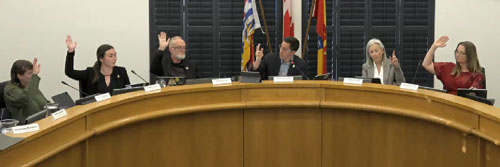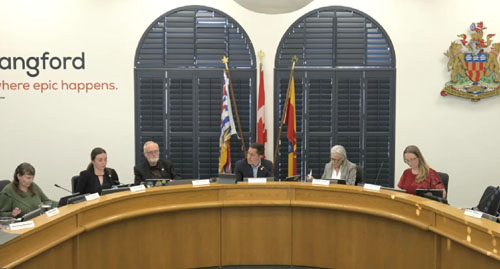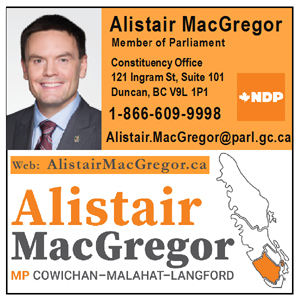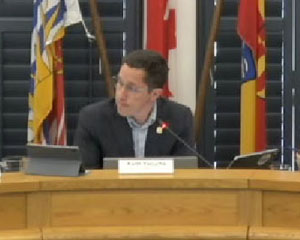
Monday May 6, 2024 | LANGFORD, BC [Updated May 7, 2024 – 8:50 am]
Sociopolitical analysis by Mary P Brooke | Island Social Trends
Renters in Langford are struggling. That was a frequently stated message by several people who provided public input for about an hour during the City of Langford council meeting this evening.

The comments were made in the context of Council considering passing their 2024 budget which includes a 15.64% property tax increase. Council has argued that they are adjusting for insufficiencies by the council in years prior to their election in 2022 and that having kept property taxes artificially low has led to the need to catch up to providing services in the fast-growing community.
Last year the Langford municipal property tax increase was 12.41%. This impact is getting passed on to homeowners as well as renters (through the taxes paid by residential landlords).
The five-year financial plan shows property taxes then set at 11.19 per cent for 2025 and decreasing to 7.87 per cent in 2026, 7.99 per cent in 2027, and 4.89 per cent in 2028 as reported in the City of Langford’s Proposed 2024-2028 Financial Plan.
Renters and landlords:
Landlords naturally seek to cover their costs, and raise rents accordingly. When the provincially-allowed 3.5% rent increase is not enough, there are cases of renoviction and inflation-eviction.
This creates hardship for renters who are suddenly expected to pay a much higher rent — if indeed they can find another suitable living space in Langford.
Pressure on renters includes the impact of municipal property taxes on landlords (who pass the cost along). This is a situation that is especially acute in Langford where the expansion of housing over the years has included many homes with suites.
Putting a roof over one’s head of course takes priority over pretty much nearly everything else. If a displaced renter indeed finds another place to live, then there is additional pressure on everything else in the household budget including important essentials like groceries and any medications.
- “Nothing is being done for renters,” said Langford resident Devin Dignam. He said that keeping municipal property taxes low subsidizes homeowners, and others are more deserving of assistance.
- “Better protection for renters” is needed, said Langford resident Sarah Plank.
- “Landlords will cover their costs,” said Nicholas Johal, noting that renters then have to somehow find additional income somewhere.
Landlords will of course be coping with municipal property tax increases of over 12% last year and again 12% this year. As well, they are likely having to cover mortgage and insurance cost increases. This gets passed along to renters, or renters are displaced so that new renters who can afford the location are accommodated. In that respect, renters face larger increases than the average homeowner.
As well, corporate landlords frequently increase rents by the maximum provincially-legislated annual amount each year to improve their bottom line; by trying to appease landlords in this way, the provincial government is essentially guaranteeing a rent increase for renters each year.
Affordable housing:
Renters might try to get into home ownership.
On the Attainable Home Ownership Program as discussed this evening, the buzzwords “affordable and deeply affordable housing” were used by Councillor Mary Wagner and Councillor Keith Yacucha.
“That is a current hole in policy — there’s not a lot of support of median income households,” said Yacucha this evening. “We need to still do more for affordable housing on the lower income sides” said Yacucha, who was chairing tonight’s council meeting as acting-mayor.
Housing is “not just on the shoulders of municipalities”, said Councillor Lilliam Szpak.
“We are doing our absolute best and the province needs to step up. We do advocate for that at the Capital Region (CRD level) for truly affordable housing,” said Szpak, even though the required income levels for CRD affordable housing are questionably ‘affordable’. “It is a regional and provincial issue,” said Szpak.
As for the province ‘stepping up’, the current BC NDP government has over the past year introduced multiple pieces of legislation to deal with a range of issues in housing including freeing up short term rentals for long-term rental (or resale as homes), allowing for multiplexes on single family lots, allowing for secondary suite construction in private homes (and providing forgivable loans to that end). See: HOUSING NEWS
Tax commentary:
Councillor Keith Yacucha said tonight that the city in their budget is trying to “lessen the practice of subsidizing our wealthiest homeowners” at the expense of others in the community.
Yacucha also said it is easier to keep taxes artificially low as a way to gain political popularity than to try and see the overall needs of the broader community.

===== ABOUT THE WRITER:
Island Social Trends Editor Mary P Brooke has been covering west shore regional news since 2008 through socioeconomic lens and with political analysis.
After covering the COVID pandemic daily in 2020-2022 Ms Brooke has reported alongside the BC Legislative Press Gallery and also covers federal news that impacts south Vancouver Island. News articles are posted at IslandSocialTrends.ca .
In 2022, Mary P Brooke ran for school trustee in the west shore (SD62 – Belmont Zone) as a way to highlight the concerns of parents and families.
In 2023 Ms Brooke was nominated for a Jack Webster Foundation journalism award for contributing to her community through professional journalism.
In 2024 Mary Brooke has led the formation of the non-profit society called Urban Food Resilience Initiatives Society (UFRIS).









